Are you confused about the difference between
Here, we’ll break it down for you, and by the end, you’ll hopefully have all the information you need to make informed decisions about your grooming.
For those of you in the “tl;dr” crowd, we’ll summarize the entire post and get you on your way—and for those of you who really want to know what you’re talking about, we’ll dive into the finer details and describe the differences between these two products.
SUMMARY: Beard Oil vs. Beard Butter
Just the facts:
Beard oil and beard butter both have the same job: they’re designed to moisturize and soften your beard hair, hydrate the skin beneath, and relieve some of that beard itch / beardruff that a lot of guys experience. They differ in texture—beard oils are just oils and they have a slick, water-y texture, whereas beard butters are oils AND seed and/or nut butters (like cocoa butter or shea butter), and they’re a soft, spreadable semi-solid.
Both can do a great job moisturizing your beard and skin, but…
If you want to add a little shine to your beard, a
If you want something that stays in your beard for a longer period of time, beard butters usually last longer, because beard oils tend to evaporate;
If you want to alleviate beard itch and dandruff, both can do the trick, but beard butters seem to a slightly better job (but the downside is that beard butters tend to get used up a lot more quickly than beard oils do); and finally
If you’re looking for suggestions on which beard oils and beard butters we like, jump down to the “Our Suggestions for Beard Oils and Beard Butters” section at the end.
Alright! Now that you know the jist of things, here are the details:
Jobs: What Beard Oils and Beard Butters Are and Should Do
Let’s take a closer look at both these products.
Here’s what you need to know about
>
> The oils have two jobs: they moisturize your beard, to keep it from becoming dry and prickly and gross-looking, and they hydrate your skin, to relieve some of that beard itch and get rid of beardruff.
Here’s what
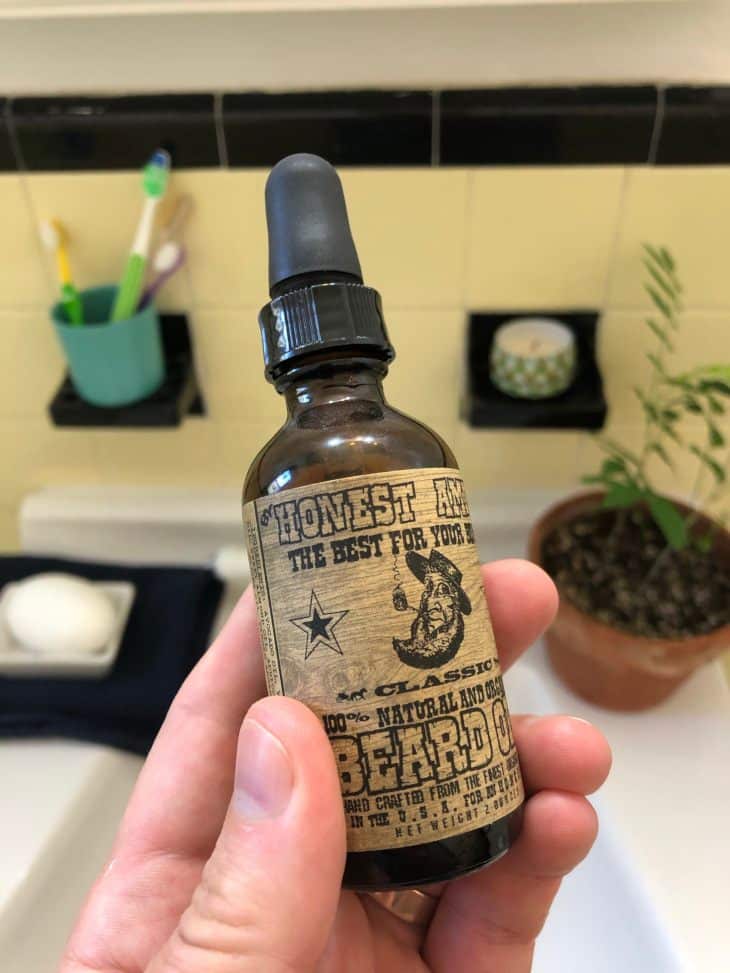
You’ll notice that there’s a little rubber tip at the top—that’s a dropper, and most beard oils some with one. They look like this:
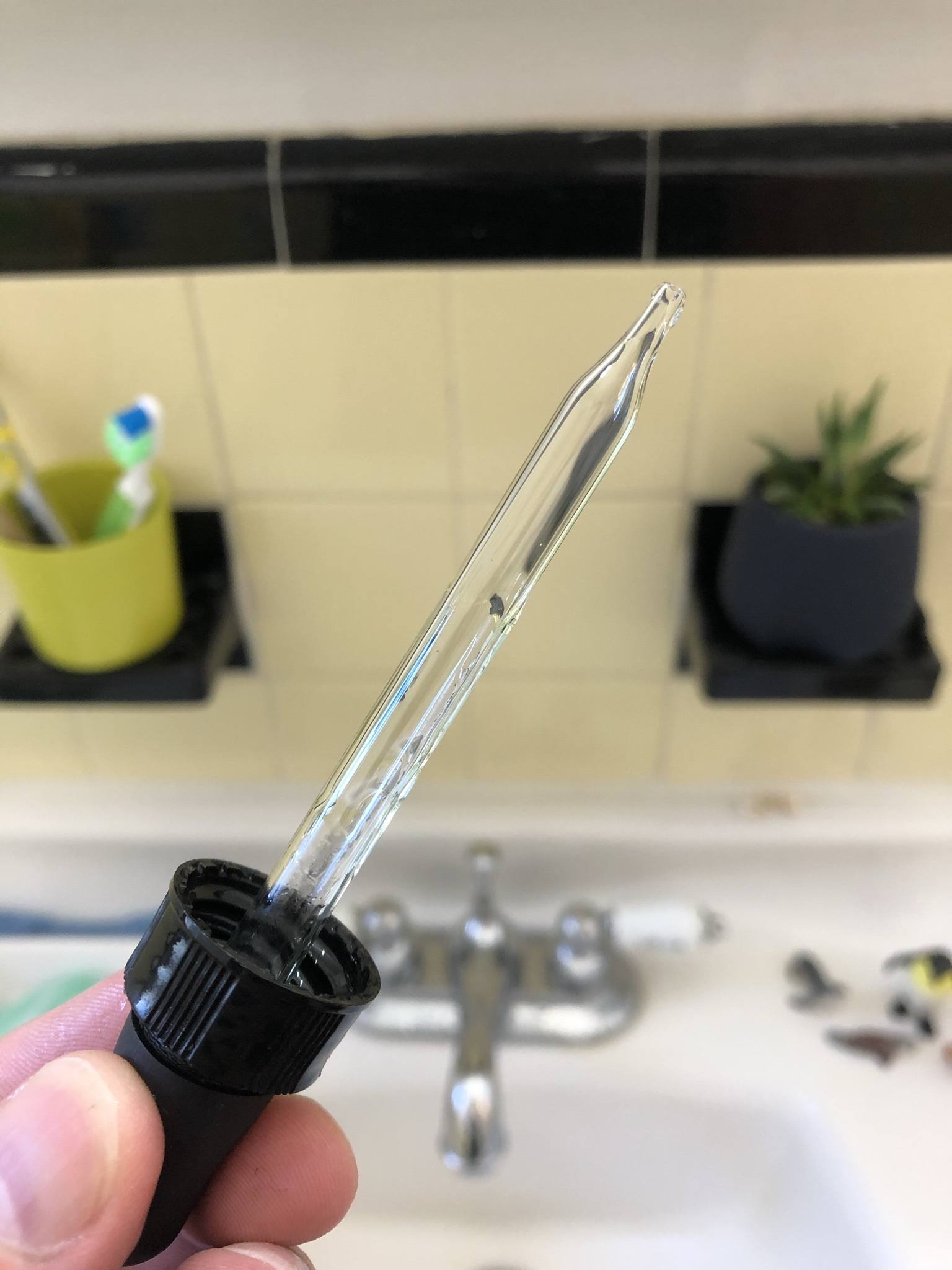
It seems like newer beard oils are ditching the dropper, though (they dribble a lot and they can leak if you put them in an overnight bag), and opting for a regular bottle with a regular opening at the top, like this:
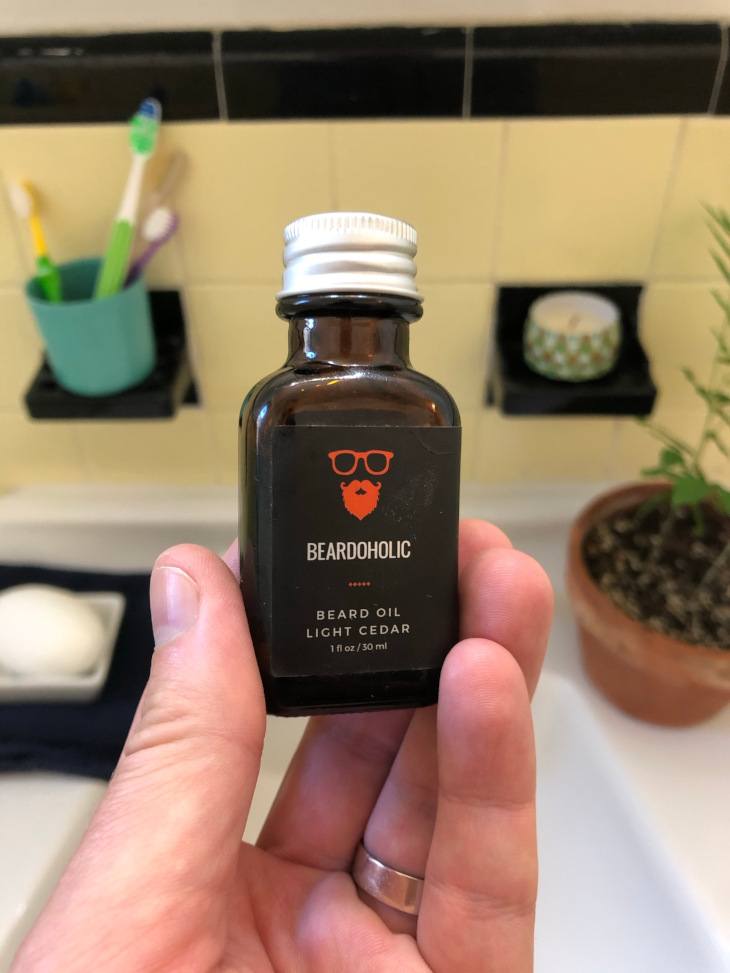
(That, by the way, is a FANTASTIC
Here’s what
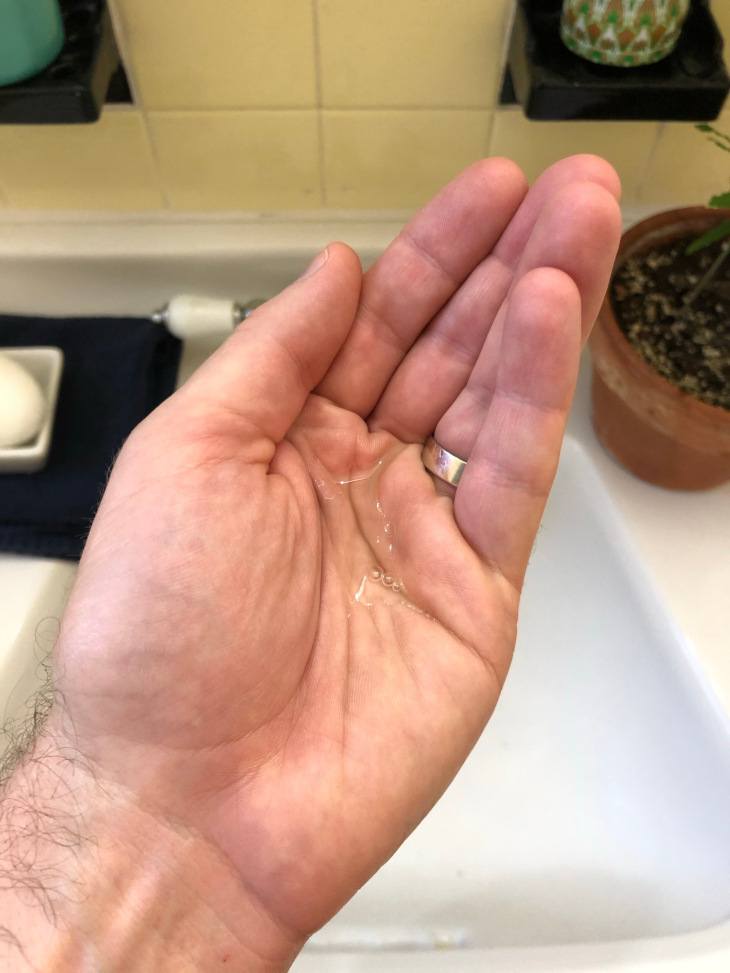
Here’s what you need to know about beard butter:
> Beard butter is a collection of oils (both carrier oils and essentials oil, like the ones we mentioned above), PLUS nut or seed butters. A “butter” is what you get when you ground a seed or a nut into a paste, and many seed and nut butters are great hair and skin moisturizers. Popular options include shea butter (that’s probably the most popular), cocoa butter, and mango butter;
> Butters are a soft semi-solid, and they also have two jobs—the same jobs as
Here’s what beard butter looks like in the tub (and they usually come in tubs, although the shapes of the tubs can vary a lot):
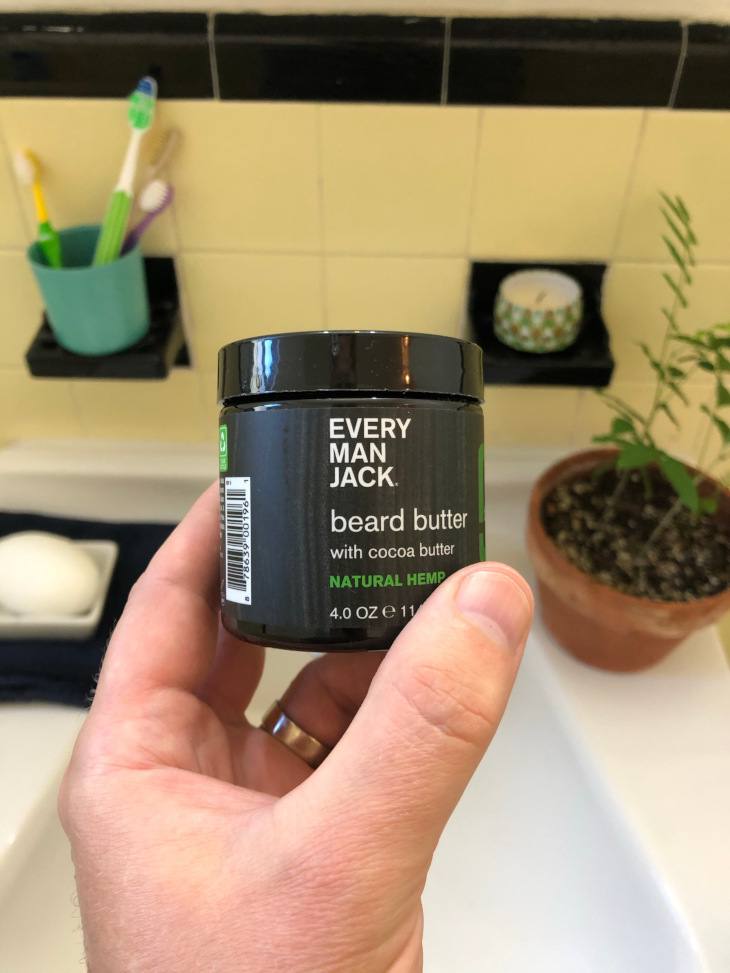
Some of the tubs get pretty large, like this one—Maestro’s Beard Butter:
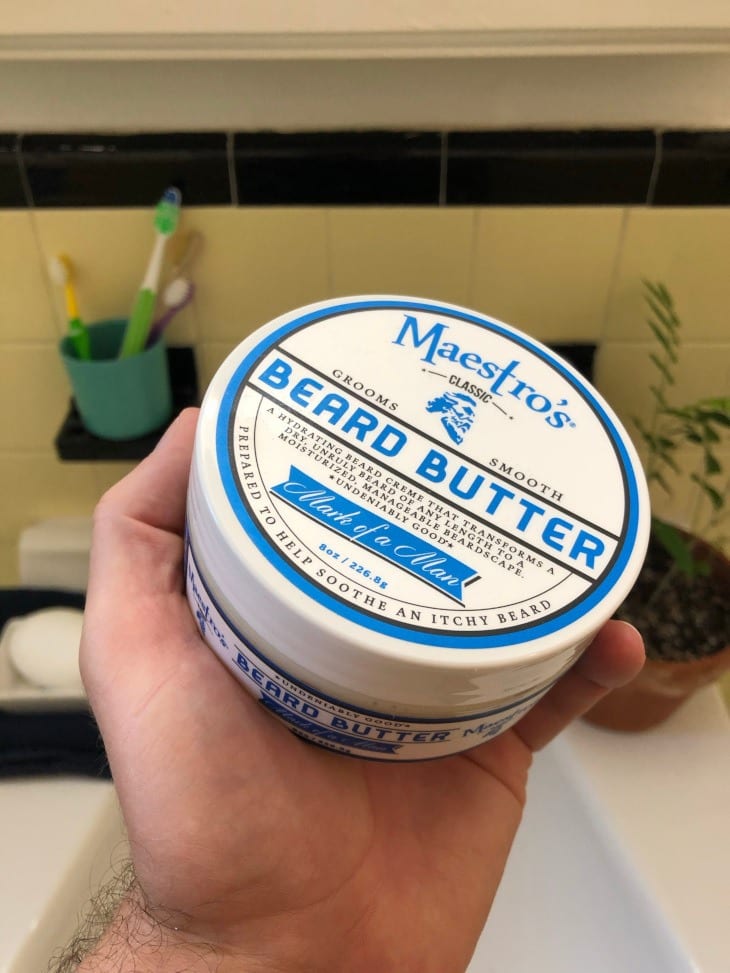
…and here’s what beard butter looks like itself:
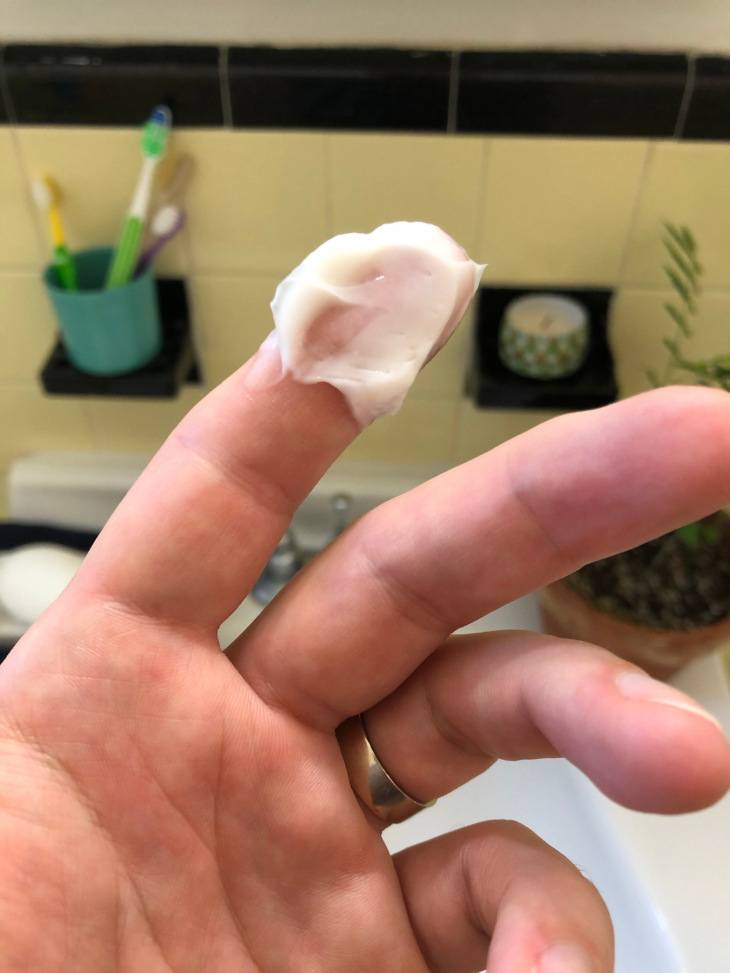
As you can see, it has a creamy, fluffy texture, and it’s very smooth.
Now you know! The two products have the same job—to moisturize your beard hair and alleviate itch and beardruff on your skin—but they just have different consistencies.
Those are the “broad strokes,” anyway. The devil is in the details, as they say, and there are some small but important differences between the two.
Advantages and Disadvantages of Beard Oil
Beard oil is by far the more popular of these two products, and here’s why people love it and/or complain about it.
Reasons You May Want to Use Beard Oil
> It’s easy to work into a beard. Because oil is a liquid, it’s easy to get it to permeate your beard—just pour a couple drops of it in your hands, rub them together, and get to work, and that’s enough to moisturize a beard and make it look shiny and healthy;
> Many of them have all-natural, all-organic ingredient lists. For most male grooming products—and a looooooooooot of female grooming products—the ingredient list is mostly chemicals and synthetics. Beard oils are that rare grooming product where it’s not difficult to find an all-natural formulation, and that’s rad;
> They can last for a while. Some beard products tend to get used up really quickly (and that’s actually an issue with beard butter!), but oil—because you only use a few drops of it—can last for a good while, and that’s also rad; and
> They’re made in some fantastic scent options. Perhaps moreso than any other of the beard products available, you can get them in a wide range of fragrances, and
Reasons You May Not Want to Use Beard Oil
> It can evaporate pretty quick. They obviously last longer than water, but oils—even the good ones—seem to wear off anywhere from 45 minutes to a few hours after application. There are a lot of other beard products that stick around for a lot longer (and we talk about that a bit later);
> Because they evaporate so quickly, you may need to apply it a couple of times during the day. You don’t have to—a couple of drops should be good enough for a small- to medium-sized beard—but plenty of guys do; and
> Some oils are better than others. It’s sad but it’s true—there are some absolutely fantastic concoctions out there, but there are some that are pretty lousy—and the lousy ones are slick and slippery and make your beard feel like an oily mop. We provide a lot of reviews about the ones we like, and try to steer people to ones we think are worthwhile, and we talk about our favorites below.
Advantages and Disadvantages of Beard Butter
Alright, now let’s take a look at the other side of the aisle:
Reasons You May Want to Use Beard Butter
There are only two ways that beard butters seem to stand out, but they’re both biggies:
> Beard butter does a GREAT job moisturizing hair and skin.
> It can provide a beard with a little “body.” That’s a huge plus, too—whereas
By the way, beard butter is often confused with beard cream or beard pomade—those are all basically the same thing. They’re all oils, butters, and sometimes some wax. Beard companies name their products whatever they want to, really, so those terms tend to get thrown around and confused. They’re all basically the same thing and do the same job.
Reasons You May Not Want to Use Beard Butter
We called it the winner a second ago—does that mean it’s perfect? Nope! Alas:
> You can run through it pretty quickly. Remember how we said that
> The formulations aren’t always “all-natural,” or at least, it can be harder to find an all-natural ingredient list. Because butters are more complicated that oils—after all, oils… are just oils—they require binding agents, emollients, etc. It’s tough to make a butter using only all-natural ingredients;
> There aren’t really many beard butter options out there.
> The scent options are limited. Beard oils have a plethora of scent experiences, and beard butters—both because there are fewer of them, and because it’s harder to get a balm to smell like something—don’t have that range. There are few single-note scents on the market, and usually what you find is a “signature scent”—a scent that the beard butter company came up with.
One last thing—beard butter doesn’t really provide much hold or styling capability. The ingredient you need to get beard hair to stay in place is wax—usually beeswax—and beard butter formulations don’t have much of it (if they have it at all). If you’re looking to hold your beard in a certain way, check out beard balm (which usually has some wax in it), or even better, beard wax (which usually has a lot of wax in it).
There you go! The pros and cons of each.
Does It Makes Sense to Use Oil *and* Butter?
You could, and if you find that works for you, the more power to you! Honestly, with all those beard products out there, there are very few “right” answers—you need to find what works for you. Some guys do, in fact, use multiple beard products, and the most common combo seems to be beard balm and
As far as a
Again, if you want to use both, give it a try! But you probably don’t need to.
Alright! That wraps up the bulk of our
Our Suggestions for Beard Oils and Beard Butters
Here it is at last! Our “Recommendations,” where we get to talk about products we love. Here’s how it shakes out:
Our favorite beard oils—a two-way tie:
Grave Before Shave Beard Oil (affiliate link): Probably one of the best-known beard oils out there. Made in a wide of creative scents, from caramel mocha to pine/cedarwood to tobacco/vanilla to tequila limon and more. Moisturizes pretty well, in our experience. Plus—and this isn’t really important, but we go nuts for this sort of thing—the artwork on the products is fantastic.
Zeus Beard Oil (affiliate link): This is our favorite “high-end” oil. It’s got a lot of great moisturizing ingredients, including jojoba oil, which, as we mentioned above, is our favorite oil (and, yes, we have a favorite oil. We run a website about facial hair—we think a lot about these things). Anyway—jojoba oil is great because it’s similar to the oil our skin produces (called sebum), and it can balance out oil production in your pores. It seems like only higher-end, better-made beard oils have jojoba oil, and that’s one of the big perks of Zeus
Runner-up: Honest Amish Beard Oil (affiliate link). The original gangsta of beard oils, this has a very sweet, spicy smell—it’s a mix of cedar, anise, and clove. Not everybody loves it, but we do. It seems to last a while too, which is nice.
Our favorite beard butters—a three-way tie:
Maestro’s Beard Butter (affiliate link). We mentioned this one earlier—it’s got a fascinating, masculine scent (grapefruit, pepper, and a not-so-well-known citrus named bergamot) and it feels nice and cool. It’s easy to work into a beard and easy to wash out, and can make a beard soft and bushy. Probably our favorite beard butter overall.
Every Man Jack Beard Butter (affiliate link). Remember how we said there aren’t many scent profiles available in beard butters? One company that bucks that trend is Every Man Jack. They’ve got a Hemp with Clary Sage and Bergamot, a sea salt and citron fragrance, and a sandalwood and vanilla mix, which is a fun take on the classic “barbershop” scent of sandalwood. In our experience, they do a great job moisturizing, particularly the hemp formulation—that’s a great moisturizer, and it will probably be in a lot more grooming products soon as people get more used to it.
Bluebeards Original Beard Saver (affiliate link). This isn’t technically a beard butter, but we absolutely love it, because it has the same feel as a butter and we’ve known it to work really well for itch on the skin and beardruff. It’s not as well-known, but the people who use it seem to have a lot of brand loyalty towards it. They also make a mint version of it, which is nice—those “single-scent” butters are kind of a rare thing.
Honestly, we’re happy recommending any of those three—we’ve used each and hold them in high regard.
Wrapping Up the Beard Oil vs Butter Comparison
There you have it! Now you know more about beard oils and beard butters than you ever thought you needed to. We hope there’s something here that helps you—be good, have fun, and happy beard!
Michael Morris is the head writer here at Rough and Tumble Gentleman. He's got a ducktail beard and loves Brazilian jiu-jitsu. He's married to the woman of his dreams and lives in Brooklyn, NY.


